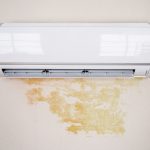
Living in the New Orleans metro area comes with its own set of unique challenges, especially when it comes to dealing with the weather. With its warm, tropical climate and high humidity levels, the city can feel unbearably sticky at times. One would think that simply turning on the air conditioning would solve the problem, but many homeowners find themselves asking: “Why is my home still humid even with the AC on?” In this blog, we’ll delve into some common reasons why air conditioning systems may not be adequately handling humidity levels, and what you can do to mitigate high... View Article

Humidity is a common factor that can greatly impact the performance and efficiency of your air conditioner. Understanding how humidity affects your AC unit is important for maintaining optimal indoor comfort and extending the lifespan of your cooling system. In this blog, we will explore how humidity can affect your air conditioner and provide tips for managing humidity levels in your home. How Does Humidity Affect AC? Humidity refers to the amount of moisture present in the air, and high humidity levels can make your home feel sticky and uncomfortable, especially during the hot summer months. When the air is... View Article
Living in Louisiana, you are well aware of the unique humidity levels that come with the territory. The combination of hot summers and high humidity can make the climate unbearable at times. As a result, residents heavily rely on their air conditioning systems to keep their homes cool and comfortable. However, the excessive humidity can have a significant impact on your AC’s performance and efficiency. In this blog post, we will discuss how the humidity of Louisiana affects your AC’s performance and offer tips to maintain optimal cooling in such conditions. Humidity and Air Conditioning: Humidity refers to the amount... View Article
Why It Feels Hotter When Humid Explained! Have you ever experienced a day where the temperature isn’t necessarily that hot, but it still feels unbearable? That’s because humidity plays a significant role in how hot it feels. Understanding the impact of humidity on our perception of temperature can help us better prepare and adjust to hot, humid climates. What is Humidity? Humidity refers to the amount of water vapor present in the air. Higher humidity levels mean there is more water vapor in the air, while lower humidity means there is less. Humidity can be measured in different ways, but... View Article
Why Humidity In The House Is Relevant For Comfort Humidity in the house is a crucial element of comfort. It can make or break your home, and affect everyone’s health and wellbeing. While relative humidity varies with the weather, ideal indoor humidity is between 45-55%. Anything above this is considered high humidity, and comes with a host of disadvantages for your home and family. Humidity Levels During hot weather, humidity can cause problems with condensation on windows and wet stains on walls and ceilings. It can also contribute to mold growth and rot in your home. In addition, high humidity levels can... View Article


